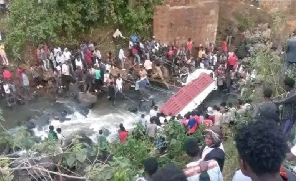President of the Nigerian Traders Association of Ghana, (NUTAG), Chwukuemeka Nnaji has alleged that the Government of Ghana is the cause of the trade war between the Nigerian community and Ghana.
He continued that the government has failed to keep their promise of finding lasting solutions to the longstanding problem and have rather instituted an inter-ministerial taskforce committee to go about locking up shops of foreigners.
“Government are not looking for solutions, they are causing the problem. They are the ones that have actually formed the taskforce and locking shops. Everything they said, they have failed to keep and I’m surprised,” he told GhanaWeb.
Chwukuemeka Nnaji stated that the only thing both government and Ghanaian traders are interested in is for foreigners to vacate their markets and the business space at large.
“Let me make it clear that there have been inconsistencies whether they are Ghanaian institutions or GUTA, they have been inconsistencies. The only thing I know they have been consistent in is that we leave their market for them. Every other thing, they have been inconsistent about it,” he stated.
“I have realized that people are so committed to making themselves happy at causing harm to other people. The Ministry of Foreign Affairs will tell you this law does not target West African nationals, and this time, she has changed…telling us that is the law and they are going to implement it to full and everybody who’s not Ghanaian not a foreigner and that’s very wonderful,” Mr Nnaji added.
The inter-agency task force on foreign retail trade set up by Government to enforce compliance of trade regulations on foreigners in the country commenced its operations on August 10, 2020.
All foreign retail shops closed by Ghana Union of Traders Association (GUTA) for flouting Section 27 of the Ghana Investment Promotion Centre (GIPC) Act, Act 865 which reserves retail trading solely to the prerogative of Ghanaians were opened for assessment and inspection by the taskforce.
The exercise is taking place in the Greater Accra, Ashanti and Eastern regions and is expected to end on September 2, 2020.
Click to view details



Business News of Wednesday, 26 August 2020
Source: www.ghanaweb.com

















